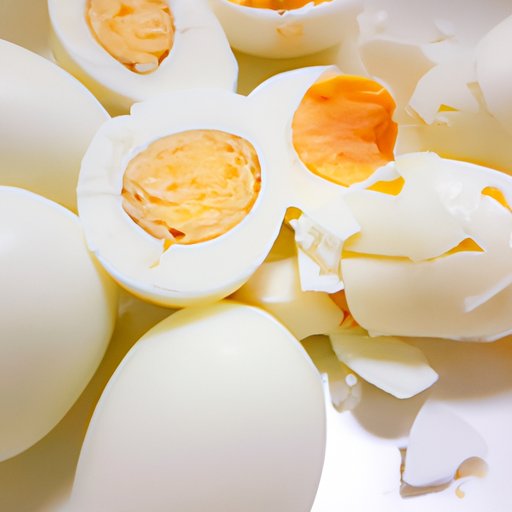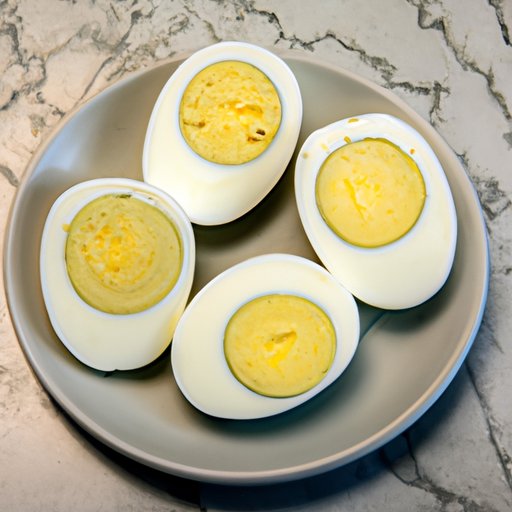
The Ultimate Guide to Making Perfect Hard Boiled Eggs
Hard boiled eggs are a versatile and healthy ingredient that can be used in a variety of recipes. However, many people struggle with making the perfect hard boiled egg, often ending up with eggs that are overcooked, undercooked, or hard to peel. In this article, we provide you with a step-by-step guide on how to make perfect hard boiled eggs, along with tips and tricks for easy egg peeling, advice on the best way to boil eggs, creative recipes to use leftover eggs, ways to season your eggs, and a look into the nutritional benefits and cultural significance of hard boiled eggs.
A Step-by-Step Guide to Making Perfect Hard Boiled Eggs
The first step in making perfect hard boiled eggs is to gather all the necessary ingredients and equipment. You will need:
- Fresh eggs
- A pot with a lid
- Cold water
- A slotted spoon
- A bowl of ice water
To prepare the eggs for boiling, place them in a pot and cover them with cold water. The water level should be at least an inch above the eggs. Place the pot on the stove and bring the water to a boil over high heat. Once the water boils, turn off the heat and cover the pot with a lid.
The boiling time depends on the desired yolk texture. For a soft yolk (runny center), let the eggs sit in the hot water for 4 to 6 minutes. For a medium yolk (jammy center), let the eggs sit in the hot water for 8 to 10 minutes. For a hard yolk (firm center), let the eggs sit in the hot water for 12 to 15 minutes.
The key to preventing the eggs from overcooking or undercooking is to keep track of the time and use a slotted spoon to remove the eggs from the water as soon as the desired cooking time is reached. Immediately transfer the eggs to a bowl of ice water and let them chill for at least 5 minutes.
Tips and Tricks for Easy Egg Peeling After Boiling
Have you ever had difficulty peeling a hard boiled egg? The trick to easier egg peeling is to understand why some eggs are harder to peel than others.
One tip is to add vinegar to the boiling water. This helps to loosen the shell from the egg white, making it easier to peel. Another trick is to crack the shells before boiling. This method results in large cracks that allow the water to seep in and separate the shell from the egg white.
To store boiled eggs for later use, place them in an airtight container in the refrigerator and consume them within a week. Hard boiled eggs can also be frozen, but their texture may change once thawed, so they might not be suitable for all recipes.
The Best Way to Boil Eggs: Stove-Top or Instant Pot?
The stove-top method is the most traditional and widely used method for boiling eggs, but the Instant Pot is a newer and more convenient option for busy people.
The stove-top method involves boiling the eggs in a pot of water on the stove, while the Instant Pot method uses pressure to cook the eggs. The main advantage of the Instant Pot method is speed and consistency – it takes just five minutes to cook the eggs, regardless of how many you are boiling.
When cooking eggs in the Instant Pot, add one cup of water to the pot and place a trivet on top. Arrange the eggs on the trivet and seal the lid. Cook on high pressure for 5 minutes and then let the pressure release naturally for 5 minutes before quick-releasing any remaining pressure. Immediately transfer the eggs to a bowl of ice water and let them chill for at least 5 minutes.
Creative Recipes to Use Up Leftover Hard Boiled Eggs
Hard boiled eggs can be used in a variety of creative ways in the kitchen. Here are some recipe ideas to inspire you:
- Egg salad: Mash the boiled eggs with mayonnaise, mustard, and chopped herbs for a classic sandwich filling.
- Deviled eggs: Slice the boiled eggs in half, remove the yolks, mix with spices and mayonnaise, and fill the egg whites with the yolk mixture.
- Indian masala egg salad: Mix diced boiled eggs with chopped tomatoes, onion, cilantro, and spices such as garam masala and cumin for a spicy twist.
- Onigiri with egg filling: Fill Japanese rice balls with chopped boiled eggs and season with soy sauce and furikake (rice seasoning).
Incorporate boiled eggs into breakfast, lunch or dinner options by adding them to salads, quesadillas, fried rice, and more.
Adding Flavor to Your Hard Boiled Eggs: Ways to Season Your Eggs
Hard boiled eggs are a blank canvas that can be seasoned in endless ways.
For simple seasonings, sprinkle your eggs with salt and pepper, paprika, or hot sauce. For more elaborate toppings, spread avocado mash on the eggs and top with everything bagel seasoning or add a dollop of sour cream and salmon roe. Don’t forget to balance flavors and textures – for instance, try pairing spicy toppings with creamy egg yolks or crunchy toppings with soft boiled egg whites.

The Nutritional Benefits of Hard Boiled Eggs and Why You Should Add Them to Your Diet
In addition to being tasty, hard boiled eggs are a nutritional powerhouse. They are rich in high-quality protein, healthy fats, vitamins, and minerals, including Vitamin D, which is important for bone health.
Boiled eggs are also a healthier option than fried or scrambled eggs, as they do not require added oil or butter. One large boiled egg contains only around 78 calories and is low in carbohydrates.
To benefit from the nutritional value of eggs, experts recommend consuming up to one egg per day in a balanced and diverse diet.
The History and Cultural Significance of Hard Boiled Eggs in Different Countries
Boiled eggs have a rich cultural history and are often used in traditional customs and ceremonies.
In many Christian countries, especially in Europe and North America, hard boiled eggs are an important element of Easter celebrations. Decorated boiled eggs made with various coloring techniques symbolize new life and fertility.
In traditional Jewish cuisine, hard boiled eggs are part of many symbolic dishes such as matzo ball soup, pickled eggs, and gefilte fish.
In Africa, boiled eggs are part of the daily diet and are often used to enrich stews and soups.
In the Philippines, boiled quail eggs and salted duck eggs are a popular snack, while in China, tea eggs – hard boiled eggs steeped in tea, soy sauce, and spices – are a street food favorite.
Interesting factoid: In Scotland, there is a dish called “tattie scones and boiled eggs” – a traditional breakfast consisting of boiled eggs served with potato scones.
Conclusion
In conclusion, making perfect hard boiled eggs is easy as long as you follow the right steps and keep some tips in mind. Whether you prefer the stove-top or the Instant Pot method, boiled eggs can be used in countless creative recipes and seasoned in a variety of ways. By including boiled eggs in your diet, you can benefit from their high nutritional value. Finally, boiled eggs have a rich cultural history and are used in many different customs and traditions around the world.
Now it’s your turn! Share your own tips and traditions around boiled eggs in the comments below.




